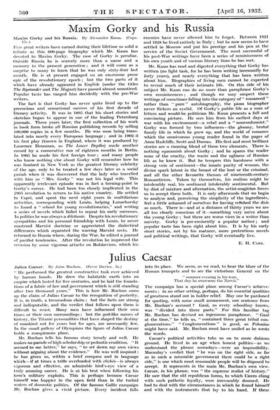Maxim Gorky and his Russia
Maxim Gorky and his Russia. By Alexander Krum. (Cape.
15.)
Few great writers have earned during their lifetime so solid a tribute as this 000-page biography which Mr. Kaun has devoted to Maxim Gorky. The case of Gorky is peculiar. Outside Russia he is scarcely more than a name and a memory to the present generation ; and it will come as a surprise to many to learn that he was only sixty-four last nmeth. He is at present engaged on an enormous prose epic of the revolutionary epoch ; but the two parts of it which have already appeared in English (under the titles The Bystander and The Magnet) have passed almost unnoticed. Popular taste has ranged him decidedly with the pre-War writers.
The fact is that Gorky has never quite lived up to the precocious and sensational success of his first decade of literary activity. It was in 1895 that his short stories and sketches began to appear in one of the leading Petersburg journals. Three years later, the first collection of his work in book form broke all Russian publishing records by selling 100,000 copies in a few months. He was soon being trans- lated into nearly every European language ; and in 1902-3 his first play (known in England, where it was produced by Laurence Housman, as The Lower Depths) made another record by a consecutive run of eighteen months in Berlin. In 1905 he made his first foreign tour ; and many people who know nothing else about Gorky will remember how he was lionized in New York as the greatest literary celebrity of the age, only to be treated a few days later as a social pariah when it was discovered that the lady who travelled with him as "Mrs. Gorky" was not his legal wife. This apparently irrelevant episode was in fact a turning-point in Gorky's career. He had been too closely implicated in the 905 revolution to return to his native country. He settled In Capri, and spent the next eight years in multifarious activities, corresponding with Lenin, helping Lunacbarsky to found a "school for young revolutionaries," and writing
series of novels which failed to repeat his early successes. In politics he was always a dilettante. Despite his revolutionary sympathies and his personal friendship with Lenin, he never mastered Marxist doctrine or appreciated the dialectical differences which separated the warring Marxist sects. He returned to Russia where, during the War, he edited a journal of pacifist tendencies. After the revolution he improved the occasion by some vigorous attacks on Bolshevism, which his
enemies have never allowed him to forget. Between 1921 and 1928 he lived entirely in Italy ; but he now seems to have settled in Moscow and put his prestige and his pen at the service of the Soviet Government. The most successful of his post-War writings have been a series of reminiscences of his own youth and of various literary lions he has met.
Mr. Kaun has read and digested everything that Gorky has written (no light task, for he has been writing incessantly, for forty years), and nearly everything that has been written about him. Biographies of living men cannot be expected to reveal much of their intimate life. On this side of his subject Mr. Kaun can do no more than paraphrase Gorky's own reminiscences ;. and though we may suspect these writings of sometimes falling into the category of" romanced" rather than 'pure" autobiography, the pious biographer never flickers an eyelid. Of Gorky's public life as a man of letters and would-be politician Mr. Krum presents a full and convincing picture. He sees hint from his earliest days at war with his environment—a rebel and a "nonconformist." Gorky was formed by two influences—the gloomy, brutal family life in which he grew up, and the world of romance which the omnivorous young reader found in the pages of Anne Radcliffe, Scott and Dumas. His first and most brilliant stories are a cunning blend of these two elements. There is nothing squeamish about Gorky ; and he spares the reader none of the cruelty, the waste and the ugliness of Russian life as he knew it. But he tempers this harshness with a strong vein of sentiment—the innate purity of woman, the divine spark latent in the breast of the lout or the criminal, and all the other favourite themes of nineteenth-century Romanticism. Taken by themselves, his realism might be intolerably real, his sentiment intolerably sentimental. But by dint of mixture and alternation, the artist-magician forces us to accept them both. It is only afterwards that we begin to analyse and, perceiving the simplicity of the ingredients, feel a little ashamed of ourselves for having rePished the dish so much. There is—and at a distance of thirty years we are all too clearly conscious of it—something very naive about the young Gorky ; but there are worse vices in a writer than naivety. Gorky is pre-eminently a popular author ; and popular taste has been right about him. It is by his early short stories, not by his maturer, more pretentious novels and political writings, that Gorky will eventually live.
E. H. CARR.








































 Previous page
Previous page